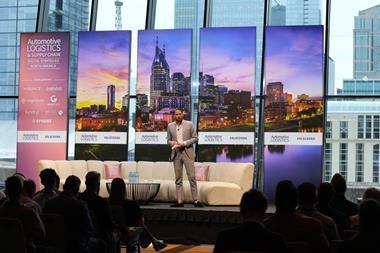Even as airspace is reopened and flights gradually resume following new European guidelines on the levels of volcanic ash safe for aircraft, the fallout from Europe’s worst ever airspace disruption continues to cause transport capacity shortages and thus supply constraints in European automotive factories, particularly at the tier supplier levels, with impacts as far as the US and Japan for BMW and Nissan, respectively. Manufacturers and premium freight providers have reported an upsurge in emergency transport, including expensive air charters, to avoid production delays. And with a freight backlog of up to two to three weeks, with the potential for further disruptions not ruled out, the industry continues to face uncertainty (a situation not helped by a two-week rail strike in France that has almost totally frozen rail movements through France to Spain; read more here).
The impact for different OEMs and tier suppliers has varied widely depending on the nature of their supply chains and buffer stocks, however for some manufacturers there has been a sense of “panic,” according to Neal Williams, managing director of Priority Freight, a specialist provider in emergency and premium freight logistics.
“All immediate efforts will be deployed in minimising exposure, but there are real indications of panic amongst various OEMs and a considerable uplift in the number of premium shipments that we are managing at this juncture,” Williams told Automotive Logistics News on Monday.
By Wednesday, even with air space reopening over much of Europe, including most the UK and Germany, Priority Freight’s CEO, Andrew Austin, confirmed that much of the damage had already been inflicted across the industry and that manufacturers were still scrambling to move freight as quickly as possible; with tight capacity and aircraft out of place, “normality” could take several weeks to return.
And even if most OEMs manage to avoid stopping production, this has come at a high price. Brad Brennan, managing director for Evolution Time Critical, another premium freight specialist that works mainly in the automotive sector, said on Wednesday that capacity was “at an absolute premium, with huge backlogs.”
Much of the problems, according to both Priority Freight and Evolution, were faced at the supplier level, particularly between tier two and tier ones, such as electronic components out of Asia.
“Given that most supply chains are now light in terms of stock-holding capacity, the OEMs are further concerned about the ‘domino’ effect in place–tier one suppliers are affected negatively by the tier twos, and so on,” Austin said.
Automotive impacts so far
The carmakers that have so far faced the most immediate impact appear to be BMW and Nissan. BMW has had to stop production at three plants in Germany, beginning from Tuesday night at Dingolfing, and at Regensburg and Munich on Wednesday and Thursday, as a result of a shortage of interior and electronic parts. A spokesperson told Automotive Logistics News that the disruptions would postpone the production of around 7,000 vehicles. “Discussions with the shop committee are already being held as to how to make up for the interruption in production in the near future,” he said.
BMW’s US plant in South Carolina had also been affected by the flight cancellations, with production slowed from a lack of transmissions that are supplied from Germany. However, on Wednesday the spokesperson said that from the most recent perspective, with airspace open, production at plants abroad would no longer be threatened.
Nissan said that it would halt production of 2,000 cars at its Oppama plant in Japan because it was unable to import air pressure sensors from Ireland.
Magna Steyr, a contract manufacturer in Austria that builds complete models and components for carmakers including Chrysler, Mercedes-Benz, Mitsubishi and Nissan, narrowly avoided stopping the line, according to Michael Druml, director of global supply chain management. Earlier in the week supply was getting tight in particular for intercontinental material movements, such as components from the US for Jeep Grand Cherokee production as well as material going to Japan for Nissan business. Druml also pointed to problems at sub-suppliers.
But by Wednesday Magna had avoided stopping the line. “Back up routes that flew to Dubai and Nice worked well,” Druml said.
Daimler, Ford of Europe, Opel/Vauxhall and Volkswagen have thus far said they have faced minimal disruptions. But both Daimler and VW have said that supply constraints could arise with further flight bans.
A spokesperson at the UK’s Jaguar Land Rover told Automotive Logistics News that its production had been affected for parts flown in from overseas, but following contingency measures as well with flights now resuming in the UK, the carmaker did not expect a major impact, although some uncertainty remained. “There have been a limited number of issues on the production line but nothing that has brought it to a standstill, and overseas parts will hopefully be in transit soon,” she said. “Any potential losses to production would be caught back up fairly quickly.”
Contingency measures
Manufacturers together with logistics providers appear to have avoided the worst so far with contingency plans. As of April 14th, for example, Priority Freight shifted all Intra-European airfreight to road. Aircrafts were also chartered to southern Europe and then delivered by express road transporters to northern Europe, including the UK.
Evolution’s Brad Brennan spoke of similar measures. Along with a dramatic increase in express van movement, the company had also been able to move some freight into southern Europe and then move by road. “At the moment we have one customer for whom we are doing several tonnes of material out of India, for which we have been able to book a flight into southern Europe and then truck across,” he said.
By Wednesday, Brennan also said that his company was moving a considerable amount of material by onboard courier, as well as arranging long haul charters, the costs of which “could be huge”.
TNT Express as well as time:matters, the emergency transport arm of Lufthansa Cargo, had also resorted to using vans and rail in some instances, as well as charters to outside Europe.
But even as attempts to clear the massive backlogs begin, the uncertainty over what the next days or week may bring lingers on, including the possibility of further eruptions or unfavourable wind currents, as well as what authorities will decide. “Is the event truly over?” wondered Austin. “Have the ‘clear skies’ now been made available through scientific analysis or political motivation, and are they sustainable without further interruption?”
Automotive depends on airfreight more than admitted
The freight backlogs that the automotive industry faces as a result of the volcanic ash are admittedly not as severe as those seen by other industries that typically depend more on airfreight, such as consumer electronics, fruit, flowers and other commodities. Most carmakers were quick to point out that their freight movements are dominated by land and sea, a point stressed to Automotive Logistics News by officials from Ford, JLR and Opel/Vauxhall. In most cases, as Brennan pointed out, automotive manufacturers resort to airfreight only in urgent cases.
However, some parts of the automotive supply chain do rely on regular airfreight movements, particularly for electronic components, as was the case with BMW. Magna Steyr’s Druml said the manufacturer’s only planned airfreight is for electronics; while JLR also admitted it has some dedicated airfreight. Ford also flies its electronic engine control module, an expensive but light component from Europe to Asia, according to Rick DeMuro, director of material planning and logistics for the carmaker in the region. Ford had enough stock to avoid production delays, however.
“As long as the situation clears within nine days, we should be okay,” DeMuro said on Tuesday.
But besides electronics, manufacturers may depend more than prior on airfreight as a supplement or backup to ever leaner, more global supply chains. The current crisis may only underline this.
At the Automotive Logistics Europe conference last month, Opel/Vauxhall’s then director of logistics, Elliot Swiss (since promoted to director of supply chain operations), revealed how the carmaker’s global platform strategy had led to a dramatic rise in foreign components and as such increases of premium freight, including imported airfreight tonnage increasing from 15 to 530 tons a month between the first quarter of 2008 and the fourth quarter of 2009 (read more here www.automotivelogisticseurope.com). Swiss suggested that the company was re-evaluating some aspects of its supply chain with a new focus on risk assessment and “total enterprise cost”.
The supply of BMW transmissions to the US from Germany, for example, is also usually done by sea but had been supplemented by air to catch up with increased demand for the BMW X5 and X6. Whether or not the current disruptions will lead to any more lasting changes in inventory or sourcing strategies remains to be seen, but Priority Freight’s Williams and Austin suggest it might do so.
“Low inventory levels and line-side replenishment activities, coupled with a large amount of foreign-sourced supply means that the next number of days, assuming there is some continuing impact, will result in significant re-assessments of short-and medium-term product supplies,” Williams said.





































